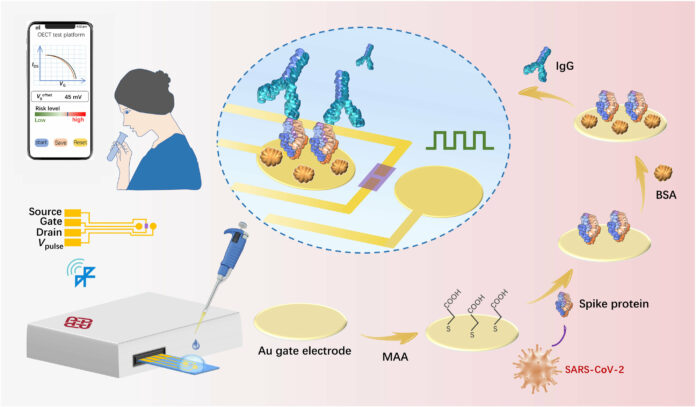
Using organic electrochemical transistors (OECTs), researchers have developed a faster and cheaper method of detecting COVID-19 antibodies in humans.
The body’s immune system produces antibodies in response to foreign organisms. These antibodies can then survive in the body for months to years. Thus, preventing any re-infections by the organism. People with low levels of antibodies are more susceptible to reinfections and deaths. The emergence of SARS-CoV-2 has led to great interest in COVID-19 antibodies.
Researchers conduct antibody testing to not only check a person’s infection status but also for vaccine evaluation and seroepidemiological analysis. Rapid detection of COVID-19 antibodies helps in choosing appropriate treatment methods and preventing virus transmission. Current methods for the detection of COVID-19 antibodies include enzyme-linked immunosorbent assay (ELISA) and colloidal gold lateral flow immunoassays (LFIAs). Although ELISA is highly sensitive, it’s a complicated procedure and not portable. On the other hand, LFIA is a simpler procedure and portable but has a low sensitivity. Therefore, there is a need for a highly sensitive and fast COVID-19 antibody detection method.
The team at The Hong Kong Polytechnic University has now developed a faster, portable, and cheaper method of detecting levels of COVID-19 antibodies. The results of their research are available in the journal Science Advances.
Ultrafast, Low-Cost, and Portable
The new detection method uses organic electrochemical transistors (OECTs). These transistors act as amplifies and can covert biological signals into electrical signals. Moreover, they are highly sensitive, low-cost, and easily available. Previously, OECTs have helped detect proteins, nucleic acids, and metabolites.
The device consists of transistors placed within plastic strips fitted onto a housing. The electrodes are modified with coronavirus spike proteins, allowing for easier capture of COVID-19 antibodies. Once a drop of saliva or blood touches the transistors, the biological signals are converted to electrical signals; software on a smartphone then analyzes these signals. Results of the test are available within five minutes.
The researchers further tested the device by using Bluetooth for controlling a portable meter. The study concludes the new method is faster, cheaper, and portable than previous ones.
After success with both blood and saliva samples, researchers plan to test the new device in clinical trials soon.
Reference:
Hong Liu et al, Ultrafast, sensitive, and portable detection of COVID-19 IgG using flexible organic electrochemical transistors, Science Advances (2021). DOI: 10.1126/sciadv.abg8387



